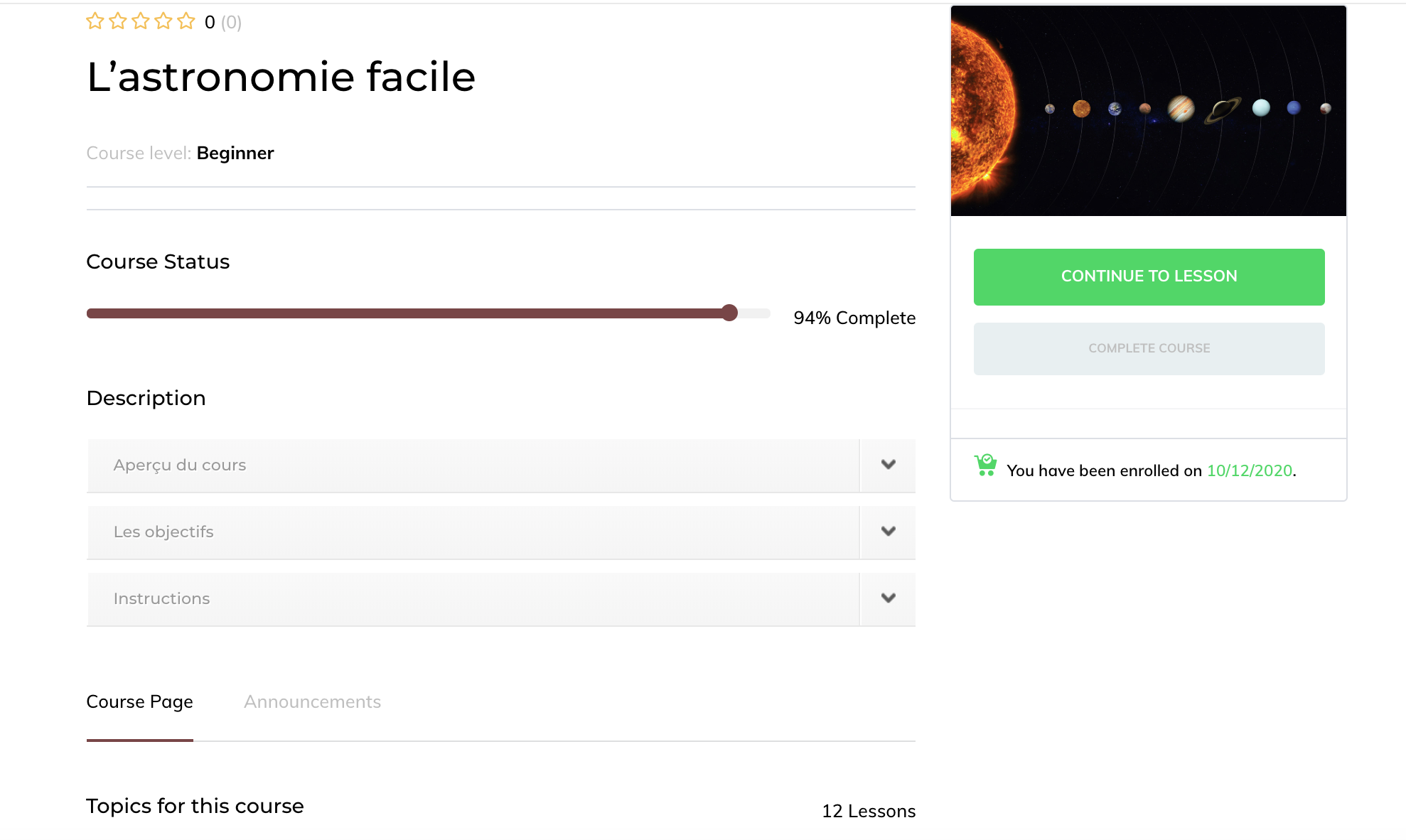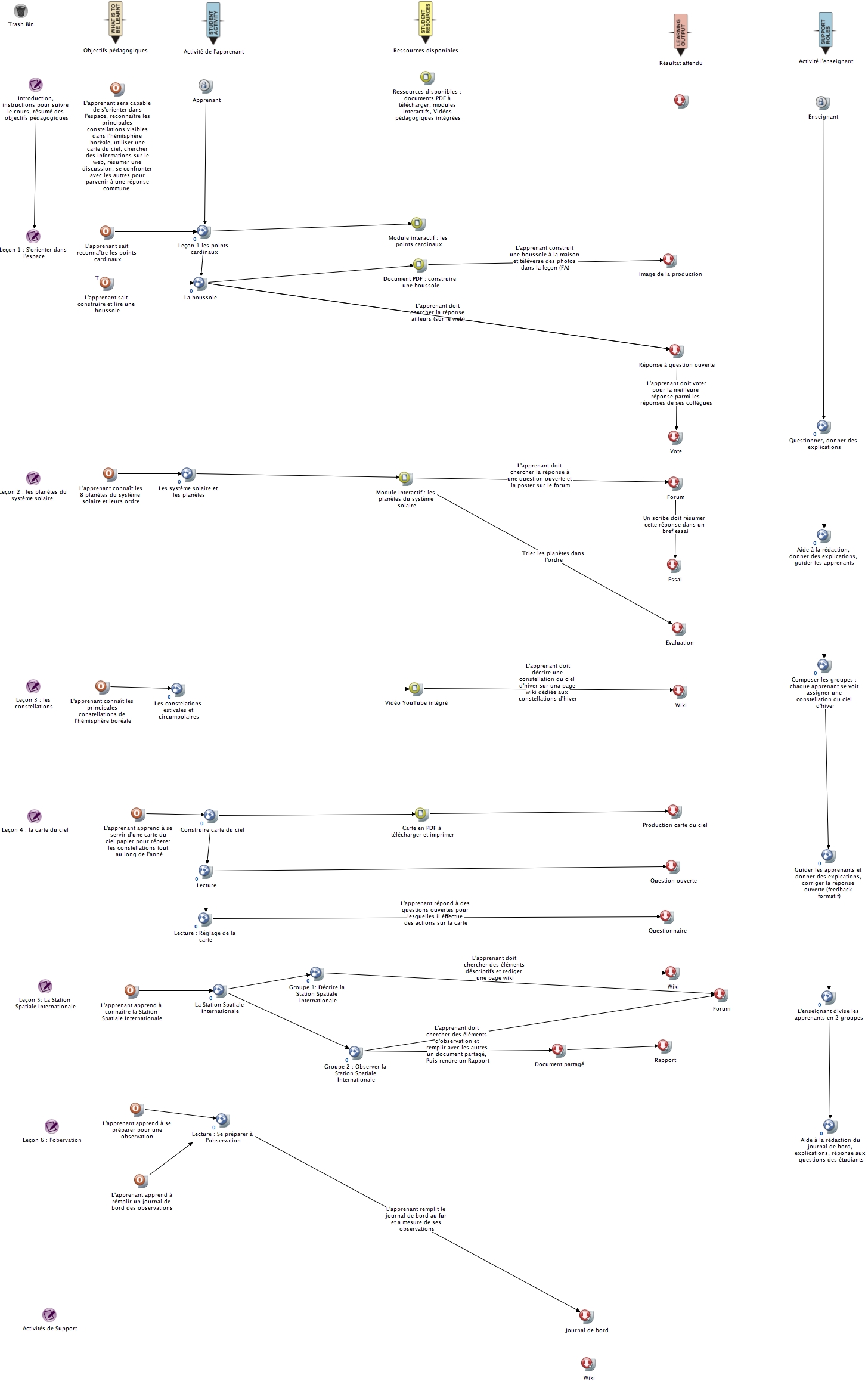Portfolio > L'astronomie facile
L’astronomie facile
Portfolio
This course (in French) could be part of the activities planned for the event Sciences Night (“La Nuit de la science”), of the Department of Culture and Sport of the City of Geneva, and organised by the Museum of the History of Science.
Developed as it is, this course is aimed at young teenage girls and boys who wish to learn enough basic astronomy so as to be able to recognise the main celestial objects visible to the naked eye. However, the course could be easily adaptable to an older audience. At the end of the course the learners will have acquired the practical bases for organising an observation evening. They will also have the opportunity to fill in an observation logbook (“Journal de bord”) to collect data relating to these observations.
The course consists of 6 modules that include several different activities:
- The cardinal points
- The planets of the solar system
- The constellations
- The planisphere (or sky chart)
- The International Space Station
- Preparing observations
During the lessons, learners are also encouraged to participate in production activities (writing short texts on different topics), or carry out practical tasks (building a compass, cutting out and assembling a sky chart). Learners are also led to search elsewhere (on the web, in an encyclopaedia, by asking questions to their friends and family) in order to learn how to search for information independently. The logbook is made available to the learners at the end of the course. This choice is due to the desire to give learners the opportunity (and not the obligation) to fill their observation journal on a voluntary basis.
No prerequisites are necessary for this course, except curiosity and the desire to learn how to observe the sky and a certain ease with the computer. At the end of the sequence they will have acquired simple theoretical knowledge and practical skills for observation with the naked eye.
The instructor/teacher, imagined to be an expert in the field involved in the organisation of the event, has a peripheral but important role. He or she is not very involved in the sequence but can give feedback on the writing activities and answers to learners’ open-ended questions.
In order to visualise the demo, you should enroll in the course using the following login credentials:
- Username: Student
- Password: AstronomieFacileStudent
Have fun!
My initial idea was to involve learners in group activities, such as collaborative writing, forum discussions, etc. The original pedagogical approach was based on the socio-constructivist theory of learning*, according to which individual knowledge relies on a social co-construction. Unfortunately, to be able to share this demo course on my website, I had to make some adjustments to my original idea and remove the collaborative activities. The original learning design, made with CompendiumLD, is detailed in the image below (a link to the full size version is available below on this page).
Even with this significant shift from collective to individual learning, this course involves all the cognitive domains of Bloom Taxonomy : Knowledge, Comprehension, Application, Analysis, Synthesis, and Evaluation.
I used the Tutor LMS plugin for WordPress to simulate the learning environment, show learning progression and track the results.
I used some cool graphics from Freepik, developed some of the modules in Articulate Rise, and then embedded them into WordPress using the Insert or Embed e-Learning Content into WordPress Plugin by e-learning freaks.
For the content development, since I have a Bachelor’s degree in Astronomy and some knowledge in observational astronomy, the conceptual development of the sequence was rather easy. As for the themes to include and the sequence of the lessons, I was inspired by this great astronomy course: AstroJuniors, organised by the French Astronomy Association and available online, free of charge.
* Keep an eye on the Learning theories series on my blog, I’ll soon write an article about socio-constructivism. In the meantime you can have a look at this article on the Open Educational Resources of UCD Teaching and Learning, University College Dublin
Sources, references and links
Other than speaking for my personal experience, all the references and resources that I used to create the project are listed here:
- Astrojunior course, by the French Astronomy Association
- The Heavens Above website for thw ISS observation
- The ISS image (Free for commercial use ) was downloaded on Pixabay. (Image credit : WikiImages from Pixabay)
- The planets pictures were downloaded from the NASA website
- The original Learning Design made with CompendiumLD.


